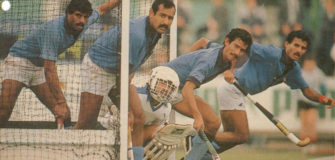Share
Last week of September is remarkable for Asian hockey especially for Indians. Sydney Olympics that ended in the last week of September twenty summers ago in particular warrants our attention for more than one reason. In the second part of the September Series, s2h brings alive the Indian hand at Sydney Olympic final. And also we revisit Sydney Olympics semifinal, how the Koreans’ suicidal runs led to change of rules etc.
Part one of the September Series: 20 YEARS AGO ON THIS DAY: “IT WAS DESTINY, NOTHING ELSE”, BASKARAN
Even as the Indian team and their multitude of supporters reeled from the devastation of missing the 2000 Sydney Olympic semifinals by a whisker, the country’s contribution to the game was still celebrated in dramatic style on this day by one man. It was South Korea manager and de facto head coach Kim Sang-Ryul whose team reached their first-ever men’s Olympic final with a 1-0 win over Pakistan, the three-time Olympic and four-time World champions.
The exuberant Sang-Ryul was a former pupil of the National Institute of Sports (NIS), Patiala. Ironically, his team sneaked through to the semifinals at India’s expense on the basis of the head-to-head criterion in which a 2-0 victory proved crucial.
Sang-Ryul picked up the nuances during his NIS time in India and attributes his firm foundation in hockey coaching to his mentor, the iconic Late Balkishen Singh, an Olympic gold medal winner himself at Melbourne 1956. Way back in 1985-86, Sang-Ryul coped with the handicap of not speaking any English and completed the 10-month course at the NIS. He drew praise from Balkishen at the time who was reported as saying in the NIS Sports Scientific Journal, “He grasped everything and, if he was in any doubt, discussed it fully with the coaches.
“Because of his physical education background he produces teams with super fitness. And his experience at the NIS allowed him to mix Indian skills with the modern technical game,” he had added.
It all seemed to add up on that day in Sydney. The achievement, though, came at a cost. Kim may have learned the ropes in India where skill and elan come to the fore but his tutelage often meant drumbeating his charges to a adopt gritty, aggressive and sometimes “suicidal” tactics.
It came to pass at Sydney’s Olympic Park where the Koreans foiled Pakistan’s most lethal weapon in the form of Sohail Abbas, probably the best drag-flicker of all time and highest scorer in the international game. The Pak maestro failed from seven such awards – as Kim’s rota of “first man out” from the goal-line put his body on the line in an effort to thwart Sohail’s salvos. One flick turned deadly, sending a Korean braveheart to hospital. His courage didn’t go in vain. Korean star striker Song Seung-Tae scored from a penalty corner variation in the 57th minute to assure his country its first ever men’s Olympic hockey medal.
The Koreans settled for silver after a fightback in the last few minutes of the final against defending champions The Netherlands (neutralizing a 1-3 deficit) to take match into extra-time and then the tie breaker which they lost.
The Korean tactics, especially against Pakistan, however had far reaching ramifications with face masks and other protective apparel at a penalty corner defence now becoming the norm. It also influenced a rule change effected before the next Olympics in Athens four years later – that of outlawing the defender rushing out from placing his/her body before the penalty corner striker.
Despite the defeat to the Dutch in the final, the Korean players chaired and tossed Sang-Ryul in the air in appreciation of his role for nearly a decade during which he moulded and shaped the team as Asia’s No. 1. Under his tutelage, South Korea won the 1993 and 1999 Asia Cup titles and the 1994 Asian Games gold culminating in the Olympic silver in Sydney. He also guided South Korea to a 1995 Indira Gandhi Gold Cup victory in New Delhi, vanquishing India, the nation who taught him the rudiments of hockey coaching.
Sang-Ryul, now coaches China’s men after quitting the job in his native Korea following controversial remarks over the women’s team under his charge. He didn’t take kindly to his players’ obsession with make-up which he claimed affected training and match preparation and was critical of their failure to follow the gameplan at the 2004 Athens Olympics.
Parting ways with South Korean hockey the next year, his influence then brought China their first Asian Games medal – a silver – and how!
China, preparing for the 2008 Beijing Olympics, beat both India 3-2 (in the pool) and Pakistan 2-1 in extra-time in the semifinals before going down to Sang-Ryul’s country of origin, South Korea, 1-3 in the 2006 Asian Games final.
Once again, the former NIS-pupil proved India’s nemesis. The defeat inflicted on his former masters deprived them of a place in the semifinals thereby making it the first time India failed to win a medal at the Asian Games. Eventually, it also led to the eight-time Olympic gold medallists failing to qualify for Beijing 2008.
Under Sang-Ryul, China made waves in the 2018 World Cup in Bhubaneswar where they made the cross-overs. A shock draw with England (2-2) and another with Ireland (1-1) enabled Sang-Ryul’s team progress despite a 0-11 loss to Australia.
A narrow 0-1 defeat to France in the cross-over ended their campaign but a 11th-place finish out of 16 was a creditable performance by any reckoning.
Sang-Ryul now speaks English quite well but having traversed countries and continents since those days in Patiala has made many a statement in the language of hockey.


